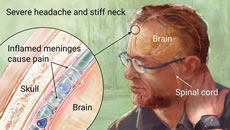Meningococcal
 | Meningococcal disease is an acute bacterial infection that can cause death within hours if not recognised and treated in time. One of the reasons meningococcal disease is hard to identify is that it can appear in several different forms, depending on which part of the body the bacteria invade. |
- Meningococcal meningitis (affecting the brain and spinal cord)
- Meningitis is inflammation of the lining of the brain and spinal cord
- There are many different forms of meningitis - fungal, viral and bacterial/bacterial meningitis, also called meningococcal disease, is the most serious form
- Meningococcal meningitis can result in permanent disabilities - such as deafness or brain injury, and can in some cases cause death
- Meningococcal septicaemia (blood poisoning)
- This is the most dangerous and deadly type of meningococcal disease
- It happens when the bacteria enter the bloodstream and multiply uncontrollably, damaging the walls of the blood vessels and causing bleeding into the skin (which results in the distinctive rash)
- Septicaemia can lead to death within hours, or permanent disabilities such as severe scarring due to skin grafts and amputation of the fingers, toes, arms or legs-due to lack of blood circulation in the extremities of the body
How it spreads
- Meningococcal disease is caused by bacteria (not by a virus), and transmitted via mucus. Meningococcal bacteria can live harmlessly in our throat and nose. Around 20% of people will be carrying these bacteria at any one time without ever becoming ill. In fact, all of us will carry them at some stage in our lives. There are many different strains of meningococcus-since the C-vaccine was introduced, the most common in Australia is now B.
- Meningococcal bacteria are not easily spread from one person to another and the bacteria do not survive well outside the human body.
- The bacteria are passed between people in the secretions from the back of the nose and throat. This generally requires close and prolonged contact with a person carrying the bacteria who is usually completely well.
- Meningococcal bacteria are not easily spread by sharing drinks, food or cigarettes.
Symptoms
Do not wait for the purple rash to appear as that is a critical stage of the disease.
Common symptoms | Meningitis only | Septicaemia only |
| Fever (which may not go down with medication) | Backache | Fever with cold hands and feet |
| Nausea or vomiting | Stiff or painful neck | Cold shivers |
| Lack of energy | Sensitivity to light | Pain in muscles or joints |
| Tiredness or drowsiness | Twitching or convulsions | Pain in chest or abdomen |
| Confusion or disorientation | Pale, grey or blotchy skin | |
| Dizziness | Rapid breathing | |
| Irritability or agitation | Diarrhoea | |
| A sore throat | A rash, which may start off as a spot, scratch mark or blister, as a faint pink rash or as red or purple pinpricks on the skin, then develop into the distinctive purple bruising |
Treatment
- Patients with meningococcal disease need urgent treatment with intravenous antibiotics
- If rash appears, in conjunction with other symptoms such as a high fever, call an ambulance for urgent treatment
- In cases where meningococcal disease is suspected, it is recommended that antibiotic treatment be started before the diagnosis is confirmed by tests
Meningococcal Vaccine: There are two kinds of meningococcal vaccines (PDF file, 100.1 KB) licensed by the Food and Drug Administration (FDA) for protection against serogroups A, C, W and Y: meningococcal conjugate vaccine (MenACWY) and meningococcal polysaccharide vaccine (MPSV4).
NOTE: QUT Medical Centre only provide MenACWY vaccine which is the preferred vaccine for ages 2 months to 55 years that have received MenACWY previously, or anticipate requiring multiple doses.
Two doses of MenACWY are routinely recommended for adolescents 11 to 18 years; the first dose at 11 or 12 years old, with a booster dose at age 16. Some adolescents, including those with HIV, should get additional doses. Ask the Doctors for more information.
Dosage and Administration
The dose of meningococcal conjugate vaccines is 0.5mL, to be given by intramuscular injection.
What do you have to do?
Book in to consult one of our Doctors today if you have any symptoms or if you would like the vaccine.